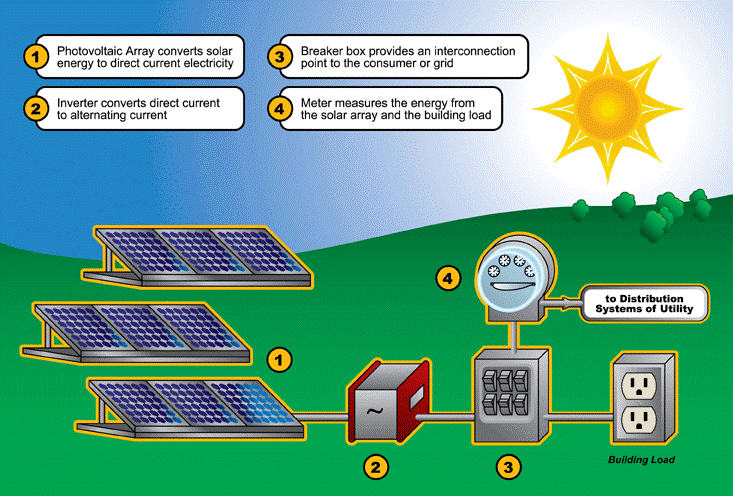Table of Contents
ToggleIn this Article we will help Homeowner understand How Solar System Works
Solar energy is a clean renewable energy source that has become increasingly popular in recent years. Understanding how solar system works can help homeowners make informed decisions when it comes to solar energy. In this blog, we will examine the complexities of solar energy and explore the materials and techniques used to build solar systems. Let’s dive in and unlock the magic behind solar production and how it can benefit homeowners.
Table of Contents
- Introduction
- Components of a Solar System
- A) Solar panels
- B) Inverters
- C) Electrical Panel
- D) Net Meter
- Solar Energy Production
- a) Solar radiation absorption
- b) Conversion of sunlight into electricity
- c) Inverter conversion
- d) Power consumption and interconnection
- Practical Benefits of Solar Energy
- a) Cost savings
- b) Environmental impact
- c) Energy independence
- d) Long-term investment
- Conclusion
- FAQs
Introduction
Solar energy is a renewable energy source that harnesses the power of the sun to generate electricity. By understanding how solar systems work, homeowners can take advantage of this clean and sustainable energy solution.
Knowing The Components of A Solar System to Help Understand How Solar System Works:
A) Solar panels (Main Component that make Solar System Works)
Solar panels, also known as photovoltaic (PV) panels, are an integral part of a solar system. These panels contain individual solar cells that convert sunlight into direct current (DC) electricity. The solar cells are made of silicon, which absorbs sunlight and excites electrons, generating an electric current. To learn more about how PV works, click here.
B) Inverters
The DC electricity generated by the solar panels is then fed into an inverter. The inverter converts the DC electricity into alternating current (AC) electricity, which can be used to power homes and buildings. To find more information about solar inverters, click here.
C) Electrical Panel
The AC electricity generated by the inverter is sent to the electrical panel of the house, where it powers the home’s electrical load. The electrical panel distributes the electricity to various appliances and outlets within the home.
D) Net Meter
A net meter is installed to monitor the electricity produced by the solar system. It allows homeowners to track the amount of electricity generated and consumed. If the solar system produces excess electricity, it can be fed back into the grid through the net meter, earning credits or rewards from the utility company. Net meters are also known as smart meters.
Understanding Solar Energy Production can Help Understand How Solar System Works!
a) Solar radiation absorption
Sunlight is composed of photons that are absorbed by the silicon cells in the solar panels. When sunlight strikes a solar cell, the photons excite electrons within the cell, generating electricity.
b) Conversion of sunlight into electricity
The absorbed sunlight causes electricity to flow across the solar cells, resulting in a flow of electrons. This flow of electrons generates direct current (DC) electricity, which flows in one direction.
c) Inverter conversion
The DC electricity generated by the solar panels is transferred to an inverter. The inverter converts the DC electricity into alternating current (AC) electricity, which can be used to power electric appliances and devices in the home.
d) Power Consumption and Interconnection (Core Concept About How Solar System Works and How it Benefits HomeOwners)
The AC power produced by the inverter is supplied to the electrical panel of the house, where it powers the electrical load. If the solar system generates more electricity than the household uses, the excess electricity is fed back to the grid through the net meter, earning credits or rewards from the utility company. Click Here for more information.
Conclusion:
Understanding how solar system works allows homeowners to make an informed decision to choose solar. When homeowners use solar panels, inverters, and interconnected DC and AC power to generate clean and sustainable electricity for their homes By adopting solar energy, homeowners can save money conserving, reducing environmental impact, and achieving independent energy production. Take the first step towards a greener future by exploring the potential of solar energy for your home, make sure you are linked with top solar installer in your area. Request your free Consultation today, LEARN MORE.
Disclaimer: The information presented in this blog is for informational purposes only and should not be considered as professional advice. It is recommended that you consult with a qualified solar professional or installer for specific instructions on the installation of your solar system. Click Here to read more about How Solar System Works.


